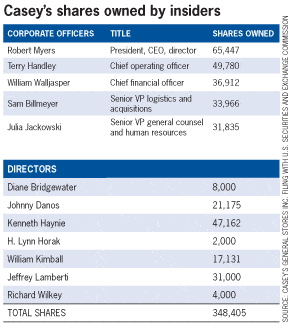Judge seeks a break from Casey’s lawsuits


District Judge Karen Romano, in a ruling that combined lawsuits seeking class-action status for holders of Casey’s common stock who want to force the Ankeny-based chain to negotiate with its suitor, said more cases would “confuse and delay” pending litigation.
When Romano issued her ruling earlier this month, two cases were pending in Polk County District Court, with both claiming that Casey’s board of directors breached its fiduciary duty by refusing to negotiate with Alimentation Couche-Tard Inc., the Quebec-based company that has offered $36.75 a share for Casey’s.
Brad Schroeder, whom Romano has appointed lead counsel along with the Boca Raton, Fla., law firm Saxena White P.A., said the chief argument in the combined lawsuits is that Casey’s board has squelched all efforts to increase shareholder value.
Couche-Tard began making overtures to Casey’s in October 2009, and has been rebuffed in each attempt to strike a deal with the company. Couche-Tard formally announced its efforts to buy Casey’s in April, followed in June by a tender offer to Casey’s shareholders.
In addition to telling shareholders to ignore the offer, Casey’s created a “poison pill” that would be triggered after any individual or company acquired 15 percent of the company’s stock. The two-pronged attack would allow Casey’s shareholders to buy stock at a discount and, in the event of change of ownership, would allow shareholders to obtain the acquiring company’s stock at half price.
“As a shareholder, you’re left scratching your head and wondering why the company you own wouldn’t be trying to maximize your share price,” Schroeder said. “If there is a payoff out there on my investment, why not work toward it, or at least explore it – try to maximize that offer – and then let me decide?”
Casey’s has answered that question, in part, by announcing a buyback of up to 25 percent of its common stock at a price ranging from $38 to $40 per share.
The company announced last week that it had secured $569 million in private financing for the self-tender offer, with $500 million intended to purchase stock and $59 million earmarked to retire existing debt. The balance will be used to pay fees connected with the self-tender and general corporate purposes.
Schroeder said it is doubtful that the buyback offer will have an effect on his lawsuit, which seeks to force Casey’s to conduct an auction for the company or conduct a market analysis to determine the company’s value.
Casey’s issued a proxy statement last week to shareholders, urging them to support the re-election of current directors and severely criticizing Couche-Tard’s attempts to buy the company.
Couche-Tard is backing its own slate of officers, anticipating that they would be amenable to a Couche-Tard takeover.
Meanwhile, Casey’s announced in its proxy statement that officers and directors would not put their stock in play in the self-tender offer. In all, Casey’s insiders own 385,405 shares, or 0.68 percent, of the company’s common stock.
Some observers have said that because the directors hold less than 1 percent of the common stock, they have little incentive to negotiate a higher purchase price that would benefit shareholders, but might be to the detriment of insiders.
Couche-Tard has warned in federal court documents that the Casey’s buyback plan along with its funding mechanism could reduce the value of Casey’s stock.
Couche-Tard also claims that a “poison put” contained in the $569 million financing package could cost Casey’s up to $95 million. The “poison put” is a provision that Casey’s would repay its lenders the full amount of the financing, plus interest and make-whole payments, in the event that it is acquired.Casey’s filed a motion late last week to stay further action in a separate federal lawsuit filed against the company by a union pension fund. Casey’s argues that the case makes the same allegations as lawsuits filed in state court, and that the state cases should take precedence over the federal case.










